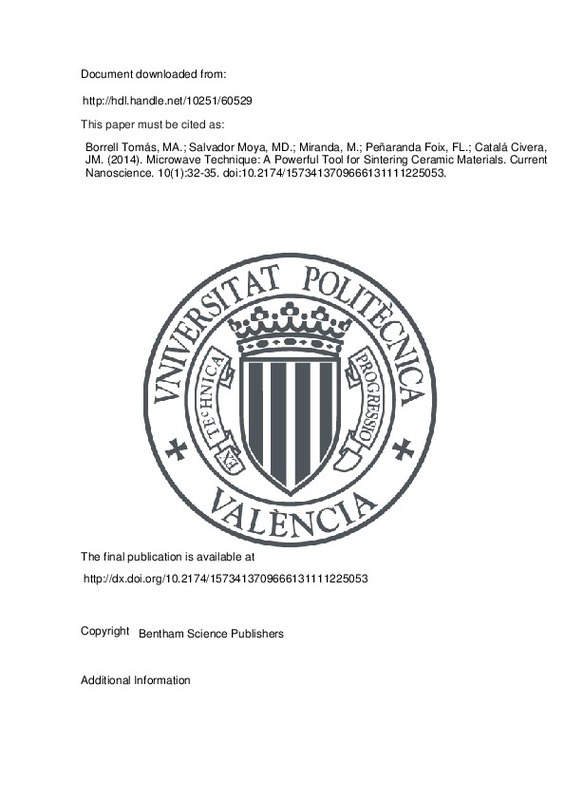JavaScript is disabled for your browser. Some features of this site may not work without it.
Buscar en RiuNet
Listar
Mi cuenta
Estadísticas
Ayuda RiuNet
Admin. UPV
Microwave Technique: A Powerful Tool for Sintering Ceramic Materials
Mostrar el registro sencillo del ítem
Ficheros en el ítem
| dc.contributor.author | Borrell Tomás, María Amparo
|
es_ES |
| dc.contributor.author | Salvador Moya, Mª Dolores
|
es_ES |
| dc.contributor.author | Miranda, Míriam
|
es_ES |
| dc.contributor.author | Peñaranda Foix, Felipe Laureano
|
es_ES |
| dc.contributor.author | Catalá Civera, José Manuel
|
es_ES |
| dc.date.accessioned | 2016-02-03T09:00:00Z | |
| dc.date.available | 2016-02-03T09:00:00Z | |
| dc.date.issued | 2014 | |
| dc.identifier.issn | 1573-4137 | |
| dc.identifier.uri | http://hdl.handle.net/10251/60529 | |
| dc.description.abstract | [EN] Microwave sintering has emerged in recent years as a promising technology for faster, cheaper and eco-friendlier processing of a wide variety of materials, which are regarded as significant advantages against conventional sintering procedures. The present investigation describes a technique for sintering two different ceramic materials by microwave heating: alumina-15vol.% zirconia and hydroxyapatite nanopowders. The results show that microwave sintering achieves higher density values, excellent mechanical properties and a homogeneous microstructure at lower sintering temperatures. The densities of microwave processed samples were close to the theoretical densities, and the near-net-shape of the green body was preserved without significant dimensional changes. The main advantages of microwave heating can be summarized as follows: a more flexible process, reduced processing times and production costs, and environmental benefits. Thus, microwaves are a clear alternative to conventional heating methods, using up to 70% less energy throughout the whole sintering process | es_ES |
| dc.description.sponsorship | This work has been carried out under a programme that supports research and development at the Polytechnic University of Valencia under multidisciplinary projects PAID2011/059, SP20120621 and SP20120677. A. Borrell acknowledges the Spanish Ministry of Science and Innovation for her JdC contract (JCI2011-10498). A. Borrell and F. L. Penaranda-Foix want to thank the Generalitat Valenciana for the grant obtained in the frame of the Program BEST/2012. | |
| dc.language | Inglés | es_ES |
| dc.publisher | Bentham Science Publishers | es_ES |
| dc.relation.ispartof | Current Nanoscience | es_ES |
| dc.rights | Reserva de todos los derechos | es_ES |
| dc.subject | Biomaterials | es_ES |
| dc.subject | Ceramics | es_ES |
| dc.subject | Grain size | es_ES |
| dc.subject | Microwave sintering | es_ES |
| dc.subject | Microstructure | es_ES |
| dc.subject | Mechanical properties | es_ES |
| dc.subject.classification | TEORIA DE LA SEÑAL Y COMUNICACIONES | es_ES |
| dc.subject.classification | CIENCIA DE LOS MATERIALES E INGENIERIA METALURGICA | es_ES |
| dc.title | Microwave Technique: A Powerful Tool for Sintering Ceramic Materials | es_ES |
| dc.type | Artículo | es_ES |
| dc.identifier.doi | 10.2174/1573413709666131111225053 | |
| dc.relation.projectID | info:eu-repo/grantAgreement/UPV//PAID2011-059/ | es_ES |
| dc.relation.projectID | info:eu-repo/grantAgreement/UPV//SP20120621/ | es_ES |
| dc.relation.projectID | info:eu-repo/grantAgreement/UPV//SP20120677/ | es_ES |
| dc.relation.projectID | info:eu-repo/grantAgreement/MICINN//JCI-2011-10498/ES/JCI-2011-10498/ | |
| dc.rights.accessRights | Abierto | es_ES |
| dc.contributor.affiliation | Universitat Politècnica de València. Instituto de Tecnología de Materiales - Institut de Tecnologia de Materials | es_ES |
| dc.contributor.affiliation | Universitat Politècnica de València. Departamento de Ingeniería Mecánica y de Materiales - Departament d'Enginyeria Mecànica i de Materials | es_ES |
| dc.contributor.affiliation | Universitat Politècnica de València. Departamento de Comunicaciones - Departament de Comunicacions | es_ES |
| dc.description.bibliographicCitation | Borrell Tomás, MA.; Salvador Moya, MD.; Miranda, M.; Peñaranda Foix, FL.; Catalá Civera, JM. (2014). Microwave Technique: A Powerful Tool for Sintering Ceramic Materials. Current Nanoscience. 10(1):32-35. https://doi.org/10.2174/1573413709666131111225053 | es_ES |
| dc.description.accrualMethod | S | es_ES |
| dc.relation.publisherversion | http://dx.doi.org/10.2174/1573413709666131111225053 | es_ES |
| dc.description.upvformatpinicio | 32 | es_ES |
| dc.description.upvformatpfin | 35 | es_ES |
| dc.type.version | info:eu-repo/semantics/publishedVersion | es_ES |
| dc.description.volume | 10 | es_ES |
| dc.description.issue | 1 | es_ES |
| dc.relation.senia | 256977 | es_ES |
| dc.contributor.funder | Universitat Politècnica de València | |
| dc.contributor.funder | Ministerio de Ciencia e Innovación |







![[Cerrado]](/themes/UPV/images/candado.png)

